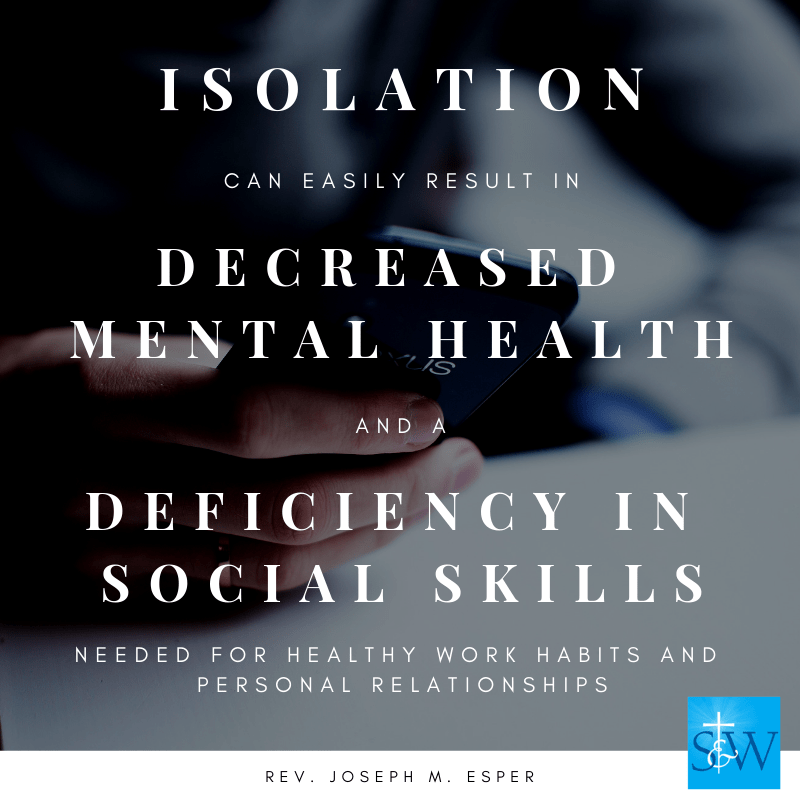
Do you by chance know the definition of a “net nanny?” Answer: a person hired to babysit kids and restrict their access to the internet, social media, and violent video games.
Who hires net nannies? Wealthy Silicon Valley executives who helped create internet sites, social media, and violent video games.
That’s right—some of the very people who create and promote the use of potentially dangerous forms of technology are going to great lengths to ensure their own children are not affected by them (from the newsletter Off-Grid Confidential, February 2019).
Technology provides wonderful benefits, but it also involves some serious dangers—such as fostering addictions, undermining relationships, warping values, retarding social development, and negatively affecting psychological, mental, and emotional health. For example, an Apple Co Corporation study shows that the average web user now has an attention span of only 8 seconds. (By comparison, a goldfish has a 9 second attention span.) Furthermore, the average American is on the internet, a smart-phone, or some other electronic gadget from six to seven hours a day. Factoring in the time also spent at work or school, when does that person have time for more important things—such as exercise, family interactions, and prayer?
Teenagers in particular are at risk for a mentally and emotionally-stunted development. Jean Twenge, author of iGen: Why Today’s Super-Connected Kids Are Growing Up Less Rebellious, More Tolerant, Less Happy—and Completely Unprepared for Adulthood, notes that “abrupt shifts in teen behavior and emotional states” suddenly emerged around 2012. Compared to the earlier millennial generation, today’s teens are much less individualistic and independent—as illustrated by far less interest on their part in getting a driver’s license, going out on dates, and spending time in person with their friends, and far more time spent in the solitude of their bedrooms with their smartphones.
Twenge writes, “What happened in 2012 to cause such dramatic shifts in behavior? . . . It was exactly the moment when the proportion of Americans who owned a smartphone surpassed 50 percent. . . . theirs is a generation shaped by the smartphone and by the concomitant rise of social media.” The resulting isolation can easily result in decreased mental health and a deficiency in those social skills needed for healthy work habits and personal relationships.

Also, teen depression and suicide have risen dramatically since 2011; there’s evidence that spending more than three hours a day on electronic devices raises a teen’s suicide risk by 35 percent—due in large part to cyber-bullying (which is more common among girls than boys). Also, data from the annual Monitoring the Future survey reveals that the longer teens are on-line, the unhappier they are, whereas those who spend more time than average in activities and relationships that don’t involve their smartphone are much more likely to call themselves “happy.” Furthermore, between 2012 and 2015 symptoms of depression rose among teenage boys by 21 percent, and by 50 percent for girls.
In response to this data, Twenge writes, “If you were going to give advice for a happy adolescence based on this survey, it would be straightforward: put down the phone, turn off the laptop and do something—anything—that does not involve a screen” (from The McAlvany Intelligence Advisor, February 2019).
Technology also poses potential hazards to adults—with one of the most prevalent examples being the use of electronic devices while driving. Texting while behind the wheel is obviously risky to oneself and other drivers—but the same thing is also true of using hands-free cell phones. According to safety expert Professor Darryl Hill of Oakland University, being engaged in a cell phone conversation creates a “cognitive” distraction: the driver’s mind isn’t fully engaged in operating a potentially dangerous vehicle. Indeed, the National Safety Council estimates that at least 20 percent of automobile crashes involve talking on hand-held or hands-free cell phones. Furthermore, a University of Utah study suggests drivers talking on cell phones are as impaired as persons driving intoxicated at the legal blood-alcohol limit of 0.08 percent (from The Macomb Daily, February 25, 2019).
In light of all these troubling trends and statistics, I have a simple suggestion: let’s use this season of Lent to examine the role of technology in our own lives. How dependent are we on our devices? Do we allow them to crowd out other, more important things? Is the Lord calling us to review and readjust our priorities?
It is very healthy—physically, spiritually, and emotionally—to make sure we have enough time for ourselves, our loved ones, and above all, for God, and Lent is a wonderful opportunity to move in this direction.

